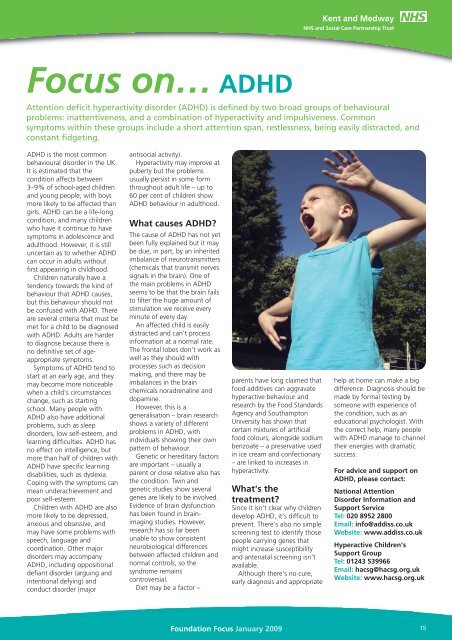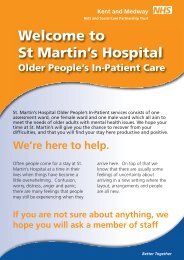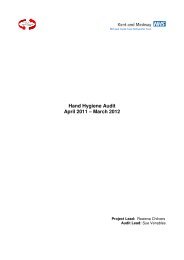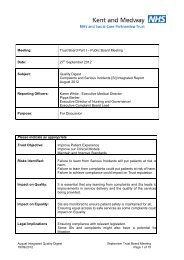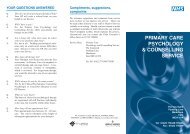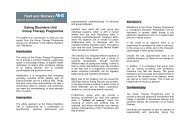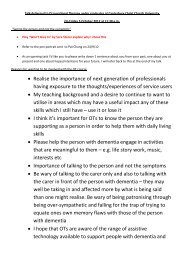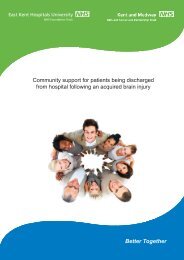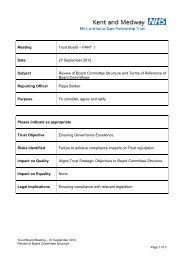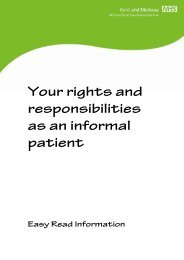Foundation Focus - January 2009 Edition - Kent and Medway NHS ...
Foundation Focus - January 2009 Edition - Kent and Medway NHS ...
Foundation Focus - January 2009 Edition - Kent and Medway NHS ...
Create successful ePaper yourself
Turn your PDF publications into a flip-book with our unique Google optimized e-Paper software.
<strong>Kent</strong> <strong>and</strong> <strong>Medway</strong><br />
<strong>NHS</strong> <strong>and</strong> Social Care Partnership Trust<br />
<strong>Focus</strong> on… ADHD<br />
Attention deficit hyperactivity disorder (ADHD) is defined by two broad groups of behavioural<br />
problems: inattentiveness, <strong>and</strong> a combination of hyperactivity <strong>and</strong> impulsiveness. Common<br />
symptoms within these groups include a short attention span, restlessness, being easily distracted, <strong>and</strong><br />
constant fidgeting.<br />
ADHD is the most common<br />
behavioural disorder in the UK.<br />
It is estimated that the<br />
condition affects between<br />
3–9% of school-aged children<br />
<strong>and</strong> young people, with boys<br />
more likely to be affected than<br />
girls. ADHD can be a life-long<br />
condition, <strong>and</strong> many children<br />
who have it continue to have<br />
symptoms in adolescence <strong>and</strong><br />
adulthood. However, it is still<br />
uncertain as to whether ADHD<br />
can occur in adults without<br />
first appearing in childhood.<br />
Children naturally have a<br />
tendency towards the kind of<br />
behaviour that ADHD causes,<br />
but this behaviour should not<br />
be confused with ADHD. There<br />
are several criteria that must be<br />
met for a child to be diagnosed<br />
with ADHD. Adults are harder<br />
to diagnose because there is<br />
no definitive set of ageappropriate<br />
symptoms.<br />
Symptoms of ADHD tend to<br />
start at an early age, <strong>and</strong> they<br />
may become more noticeable<br />
when a child's circumstances<br />
change, such as starting<br />
school. Many people with<br />
ADHD also have additional<br />
problems, such as sleep<br />
disorders, low self-esteem, <strong>and</strong><br />
learning difficulties. ADHD has<br />
no effect on intelligence, but<br />
more than half of children with<br />
ADHD have specific learning<br />
disabilities, such as dyslexia.<br />
Coping with the symptoms can<br />
mean underachievement <strong>and</strong><br />
poor self-esteem.<br />
Children with ADHD are also<br />
more likely to be depressed,<br />
anxious <strong>and</strong> obsessive, <strong>and</strong><br />
may have some problems with<br />
speech, language <strong>and</strong><br />
coordination. Other major<br />
disorders may accompany<br />
ADHD, including oppositional<br />
defiant disorder (arguing <strong>and</strong><br />
intentional defying) <strong>and</strong><br />
conduct disorder (major<br />
antisocial activity).<br />
Hyperactivity may improve at<br />
puberty but the problems<br />
usually persist in some form<br />
throughout adult life – up to<br />
60 per cent of children show<br />
ADHD behaviour in adulthood.<br />
What causes ADHD?<br />
The cause of ADHD has not yet<br />
been fully explained but it may<br />
be due, in part, by an inherited<br />
imbalance of neurotransmitters<br />
(chemicals that transmit nerves<br />
signals in the brain). One of<br />
the main problems in ADHD<br />
seems to be that the brain fails<br />
to filter the huge amount of<br />
stimulation we receive every<br />
minute of every day.<br />
An affected child is easily<br />
distracted <strong>and</strong> can't process<br />
information at a normal rate.<br />
The frontal lobes don't work as<br />
well as they should with<br />
processes such as decision<br />
making, <strong>and</strong> there may be<br />
imbalances in the brain<br />
chemicals noradrenaline <strong>and</strong><br />
dopamine.<br />
However, this is a<br />
generalisation – brain research<br />
shows a variety of different<br />
problems in ADHD, with<br />
individuals showing their own<br />
pattern of behaviour.<br />
Genetic or hereditary factors<br />
are important – usually a<br />
parent or close relative also has<br />
the condition. Twin <strong>and</strong><br />
genetic studies show several<br />
genes are likely to be involved.<br />
Evidence of brain dysfunction<br />
has been found in brainimaging<br />
studies. However,<br />
research has so far been<br />
unable to show consistent<br />
neurobiological differences<br />
between affected children <strong>and</strong><br />
normal controls, so the<br />
syndrome remains<br />
controversial.<br />
Diet may be a factor –<br />
parents have long claimed that<br />
food additives can aggravate<br />
hyperactive behaviour <strong>and</strong><br />
research by the Food St<strong>and</strong>ards<br />
Agency <strong>and</strong> Southampton<br />
University has shown that<br />
certain mixtures of artificial<br />
food colours, alongside sodium<br />
benzoate – a preservative used<br />
in ice cream <strong>and</strong> confectionary<br />
– are linked to increases in<br />
hyperactivity.<br />
What's the<br />
treatment?<br />
Since it isn't clear why children<br />
develop ADHD, it's difficult to<br />
prevent. There's also no simple<br />
screening test to identify those<br />
people carrying genes that<br />
might increase susceptibility<br />
<strong>and</strong> antenatal screening isn't<br />
available.<br />
Although there's no cure,<br />
early diagnosis <strong>and</strong> appropriate<br />
help at home can make a big<br />
difference. Diagnosis should be<br />
made by formal testing by<br />
someone with experience of<br />
the condition, such as an<br />
educational psychologist. With<br />
the correct help, many people<br />
with ADHD manage to channel<br />
their energies with dramatic<br />
success.<br />
For advice <strong>and</strong> support on<br />
ADHD, please contact:<br />
National Attention<br />
Disorder Information <strong>and</strong><br />
Support Service<br />
Tel: 020 8952 2800<br />
Email: info@addiss.co.uk<br />
Website: www.addiss.co.uk<br />
Hyperactive Children's<br />
Support Group<br />
Tel: 01243 539966<br />
Email: hacsg@hacsg.org.uk<br />
Website: www.hacsg.org.uk<br />
<strong>Foundation</strong> <strong>Focus</strong> <strong>January</strong> <strong>2009</strong><br />
15


